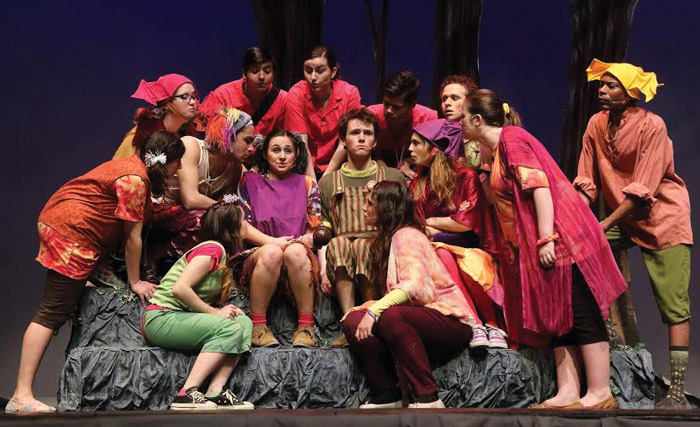It’s common for children’s stories to use fantasy and translate a moral to their young readership. Blue Planet, presented by the McGill Department of English Drama and Theatre, follows this model to a tee. Based on Icelandic author Andri Snær Magnason’s award-winning children’s book, The Story of the Blue Planet (2012), the play brings light to issues of environmental protection and ethics by directing messages toward younger audiences.
The Blue Planet is very similar to planet Earth, the only exception being that it is solely populated by children and is uninhibited by modern technology. The play begins on an upbeat note, with children playing, dancing, and singing about the joys of living on the Blue Planet. The mood goes downhill as the show progresses, when one day, best friends Brimir (Harrison Collett) and Hulda (Cara Krisman), and the rest of the children discover that a spaceship has landed on their planet. With it arrives an adult—the first on the planet—named Jolly Goodday (Shanti Gonzales, Nathaniel Hanula-James, and Bailey MacKay), who turns the childrens’ lives upside down.
The show takes a fresh look at environmental and ethical issues, wisely incorporating elements of fantasy to keep the story exciting for younger target audiences. Multiple scenes show the children manipulating their environment for personal gain, either by taking the dust off of butterfly wings for a temporary high, or moving the clouds to one side of the planet, forcing half the population to live in darkness.
The show also repeatedly plays off of the common childhood fear of the supernatural. During one point of the play, Hulda and Brimir find themselves lost in a forest, scared and alone. The trees in their midst come alive, singing ominously and touching them with their branches. The spiders, lions, and hyenas in this forest do the same, speaking to the children with vicious demeanour, showing the dramatic shift in the relationship the children hold with nature.
The sound effects of the show further force these themes to hit home. Various ominous scores play throughout dramatic scenes in which the children face danger, with loud drum beats that mimick the sound of a rapidly beating heart. Additionally, any time the children make a purchase from Jolly Goodday, selling bits of their youth in exchange for new products that guarantee happiness, a brief cha-ching! plays, to reinforce criticisms of modern consumerism and its effect on the environment.
With wisely timed musical interludes, smart depictions of childhood visions, and powerful sound effects, Blue Planet depicts modern day issues through the lens of someone too young to understand them. This perspective provides a fresh take on current issues, offering a variant from overdone lectures heard in the news and mainstream media.
Blue Planet is playing in Moyse Hall Theater April 2, 9, 10, and 11 at 7:30 p.m., and on April 4 at 1 p.m. Tickets are $10.









